Connecting minds, advancing science: Recapping the 18th annual Earl W. Davie Symposium
Thursday, January 16, 2025 Kaitlyn Chuong
Our partnership with the Centre for Blood Research (CBR) at the University of British Columbia (UBC) is helping to train the next generation of researchers in transfusion science. This blog post highlights just some of the achievements in education, training or knowledge mobilization accomplished by CBR trainees.
Prepared by CBR communications and programs coordinator Kaitlyn Chuong, this blog originally appeared on the Centre for Blood Research blog in January 2025 in a series of posts recapping the 2024 Earl W. Davie Symposium. Additional posts in the series prepared by trainees who attended along with photos from the event are available on the CBR website.
On November 13th, 2024, the Centre for Blood Research (CBR) held their 18th annual Earl W. Davie Symposium, a research event that brings together scientists, medical doctors, healthcare professionals, and trainees in the field of blood research and beyond. The symposium was held at UBC Robson Square, on the traditional territory of the Musqueam, Squamish, and Tsleil-Waututh people.
A day of research & collaboration
Now in its eighteenth year, this annual, one-day conference features expert presentations on bleeding, thrombosis and coagulation research. This event is held in-person and webcast. As attendees started to trickle in, they were welcomed with breakfast and the first view of the semi-annual CBR Magazine (November 2024 edition). The full-day program featured talks from over 15 speakers, some local to Vancouver and some from as far as Philadelphia.
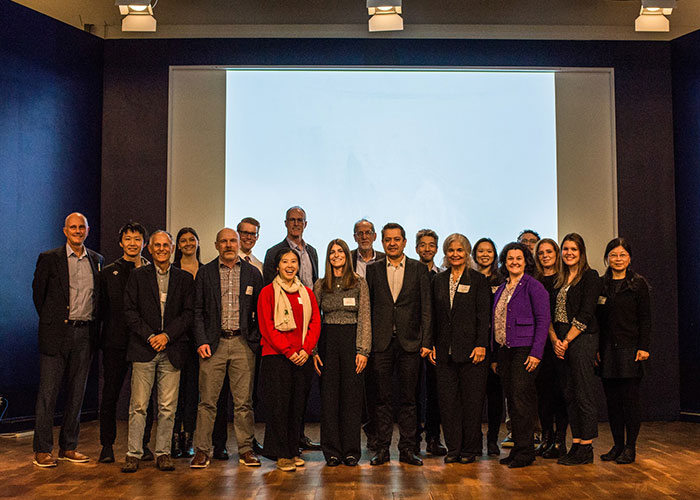
Keynote speakers
Every year, the CBR invites two keynote speakers to the symposium. This year, we were happy to welcome Dr. Toni Antalis from the University of Maryland School of Medicine and Dr. John S. “Pete” Lollar III from Emory University.
Dr. Antalis provided groundbreaking insights into the role of GPI-anchored serine proteases, specifically testisin, in coagulation, fibrinolysis, and vascular function. Her research sheds light on previously unrecognized mechanisms by which serine proteases regulate vascular function. These discoveries have potential applications in developing new treatments for diseases involving vascular dysfunction, from cancer to cardiovascular disorders.
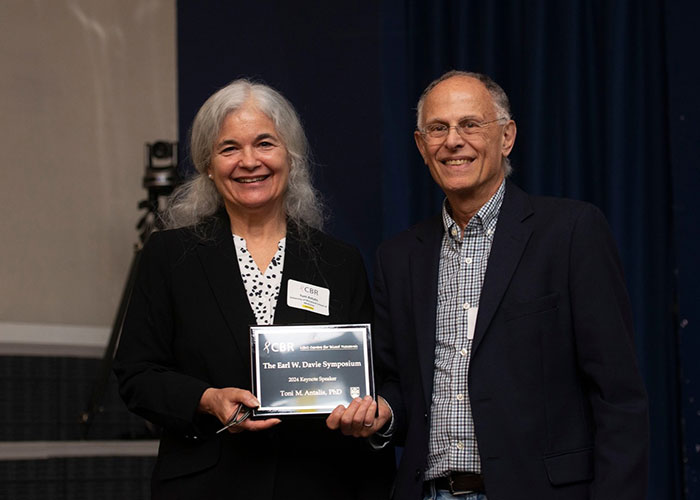
The title of Dr. Lollar's presentation was “The Conformation of von Willebrand Factor (VWF)”. He illuminated the behavior of VWF in its native state, offering a more nuanced view of its flexibility and conformational changes. This understanding could lead to advances in treatments for bleeding disorders, such as hemophilia, and inform new therapeutic strategies. His research not only challenges previous models but also contributes to innovative gene therapy approaches that may offer a cure for hemophilia A in the future.
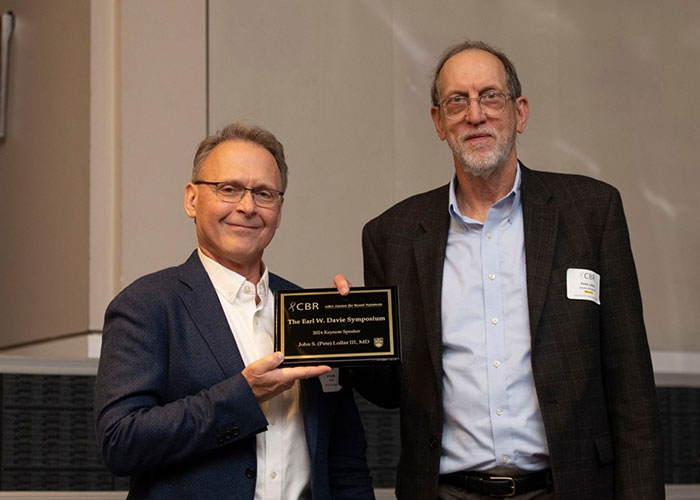
Naiman-Vickars Professorship Highlight
Each year at the Earl W. Davie Symposium, a clinician-scientist is honoured as the Naiman-Vickars Professorship in Benign Hematology. This professorship honours the legacy of Drs. Shelly Naiman and Linda Vickers, two influential hematologists who shaped the field in Vancouver and Canada. The 2024 awardee was Dr. Philip Wells, a leading clinician scientist with a passion for teaching and training, research and excellence in patient care. Dr. Wells is a renowned hematologist with expertise in venous thromboembolism (VTE), particularly in deep vein thrombosis (DVT) and pulmonary embolism (PE).
Dr. Wells discussed the management approach for patients diagnosed with subsegmental PE, particularly those who do not have DVT in their lower extremities. His team conducted a study using initial ultrasound scans to rule out DVT. Their data raises important questions about whether all patients diagnosed with subsegmental PE require anticoagulation. Dr. Wells also addressed the ongoing debate surrounding extended anticoagulation therapy for patients with unprovoked VTE. He presented research suggesting that indefinite anticoagulation may not always be beneficial, especially when considering the increased risk of bleeding. He emphasized the importance of balancing the risks and benefits of extended anticoagulation, noting that newer models provide more personalized predictions of recurrence and bleeding risks, allowing clinicians to better tailor treatment plans.
Dr. Wells’ presentation emphasized the evolving landscape of PE and VTE management. His research points to the need for more individualized approaches in both diagnosing and treating these conditions, more work on finding ways to better involve patients in decisions, as well as the potential benefits of rethinking when and how to use anticoagulation therapy. By incorporating personalized risk assessments, clinicians may be able to provide more targeted and effective treatments while minimizing unnecessary interventions.
Breaking records
This year, there was a record-high 40 posters presented by trainees, postdoctoral fellows, clinical fellows, and research associates. Many of these posters came from members within the CBR, but we also had several poster presenters from Ontario, Alberta and Washington! This year, there were three awards given out for poster presentations. The Best Poster Presentation went to Ahmed Kabil, a PhD Student in the McNagny Lab at UBC, for his work, entitled, Microbial intestinal dysbiosis drives long-term allergic susceptibility by sculpting an ILC2–B1 cell–innate IgE axis. The two runners-up were John Perrier and Alexandra Witt, both in the Pryzdial Lab at UBC.
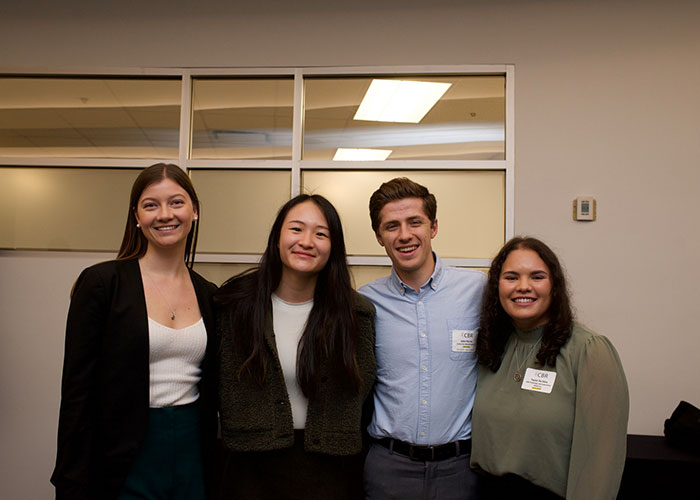
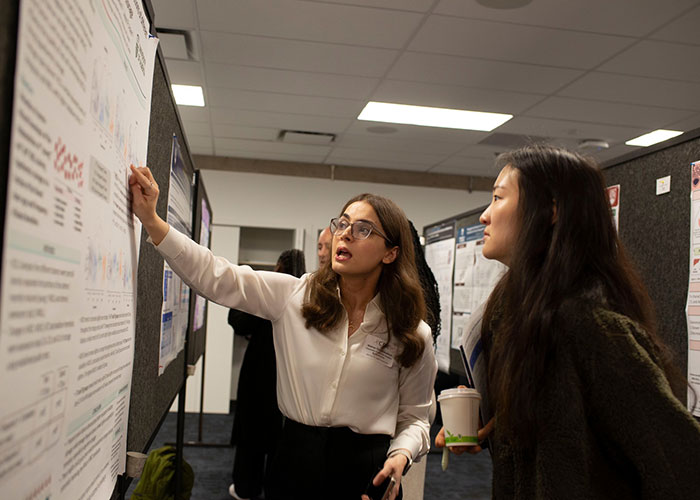
Strengthening connections
To end the day, a reception was held where all attendees got to connect and network with attendees and speakers. One of the best parts of CBR symposia is the opportunity to mingle and chat with attendees from all over North America! The CBR is fortunate to have many registrants who come from out of town in addition to all the support received from CBR members and other local registrants. The reception is a fantastic way to chat more about research findings and explore and strengthen connections that were made throughout the day.
The 2024 Earl W. Davie Symposium program, recordings, poster gallery and photos can be found here.
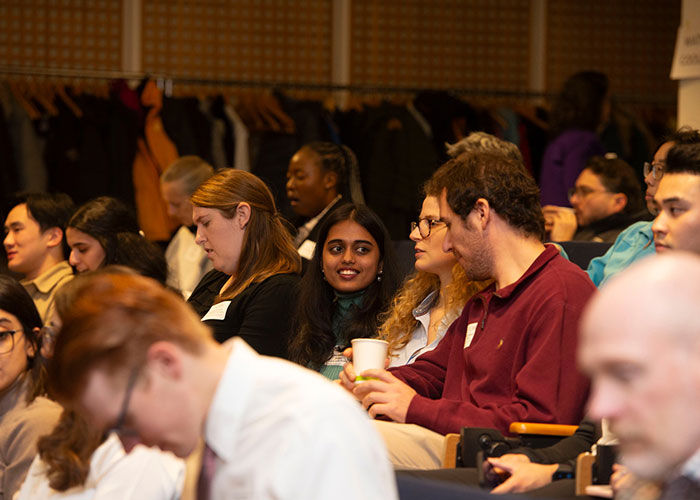
The Centre for Blood Research would like to thank their event sponsors, without whom the 18th Annual Earl W. Davie Symposium would not have been possible: the Naiman-Vickars Endowment Fund, Canadian Blood Services, Novo Nordisk, GRIFOLS, ALEXION, Sobi, Pfizer and Stago.
Canadian Blood Services – Driving world-class innovation
Through discovery, development and applied research, Canadian Blood Services drives world-class innovation in blood transfusion, cellular therapy and transplantation—bringing clarity and insight to an increasingly complex healthcare future. Our dedicated research team and extended network of partners engage in exploratory and applied research to create new knowledge, inform and enhance best practices, contribute to the development of new services and technologies, and build capacity through training and collaboration. Find out more about our research impact.
The opinions reflected in this post are those of the author and do not necessarily reflect the opinions of Canadian Blood Services nor do they reflect the views of Health Canada or any other funding agency.
Related blog posts
Canadian Blood Services’ partnership with the Centre for Blood Research (CBR) at the University of British Columbia (UBC) has been renewed to 2027 to continue training the next generation of researchers in transfusion science.
The Centre for Blood Research (CBR) Norman Bethune Symposium gathers scientists, clinicians, healthcare professionals, and trainees to discuss advancements in the field of blood research. The 12th Annual event, held in April 2024, consisted of expert talks on thalassemia, thrombocytopenia, sickle cell disease, and other bleeding disorders, demonstrating the breadth of ongoing research.
The 11th annual Centre for Blood Research Norman Bethune Symposium was held on April 6, 2022. With a focus on recent research advances in bleeding and thrombosis, the symposium engages scientists and clinicians at all levels of training.


